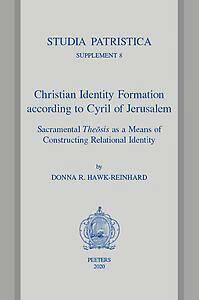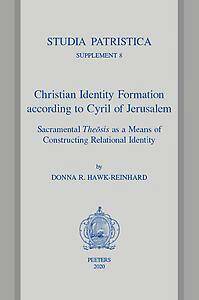
- Afhalen na 1 uur in een winkel met voorraad
- Gratis thuislevering in België vanaf € 30
- Ruim aanbod met 7 miljoen producten
- Afhalen na 1 uur in een winkel met voorraad
- Gratis thuislevering in België vanaf € 30
- Ruim aanbod met 7 miljoen producten
Zoeken
Christian Identity Formation According to Cyril of Jerusalem
Sacramental Theosis as a Means of Constructing Relational Identity
D R Hawk-Reinhard
€ 82,00
+ 164 punten
Omschrijving
This study is an exploration of how Cyril of Jerusalem constructed Christian identity for those who were preparing to enter into full communion with the church at Easter. In order to include the full catechetical teachings of the fourth-century hagiopolite tradition, the study examined the history of liturgy arguments against Cyrillian authorship of the Mystagogic Catecheses and has found, based upon the most recent scholarship, no reason to date the text to after Cyril's bishopric. Having also used codicological and textual critical analysis to support the claim of Cyrillian authorship, the study argues for a different preferred manuscript tradition than what is presented in the critical edition. Since Cyril provided an identity-clarifying attribute for the new Christians to associate with each of the rites of initiation, the study looks at the scholarly literature regarding Cyril's sacramental theology. Taking the Jerusalem catechetical writings as a pedagogical unit and examining it through word studies and flow-of-thought analysis, this study constructs a new model for Cyril's sacramental theology based upon his doctrine of theosis, which has not been examined with sufficient academic rigor to date. It demonstrates that not only does Cyril have a fully-developed doctrine of theosis, but his expression of theosis is Trinitarian, sacramental, and inseparable from his ethical and identity forming teachings.
Specificaties
Betrokkenen
- Auteur(s):
- Uitgeverij:
Inhoud
- Aantal bladzijden:
- 353
- Taal:
- Engels
- Reeks:
- Reeksnummer:
- nr. 8
Eigenschappen
- Productcode (EAN):
- 9789042939233
- Verschijningsdatum:
- 6/05/2020
- Uitvoering:
- Paperback
- Formaat:
- Trade paperback (VS)
- Afmetingen:
- 160 mm x 239 mm
- Gewicht:
- 589 g

Alleen bij Standaard Boekhandel
+ 164 punten op je klantenkaart van Standaard Boekhandel
Beoordelingen
We publiceren alleen reviews die voldoen aan de voorwaarden voor reviews. Bekijk onze voorwaarden voor reviews.











